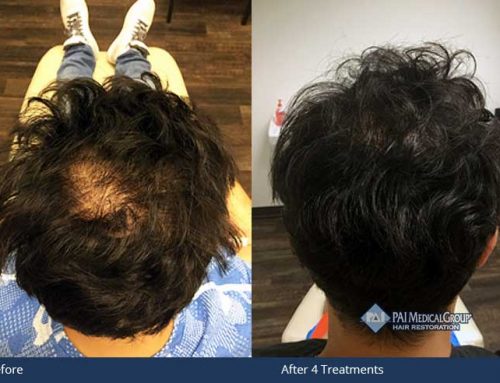Hair loss can affect anyone – and it does! It is normal to shed 50-100 hairs per day! Follicles throughout the head get tired and need rest. Once they go through this resting phase, the hair then returns. This cycle continues throughout a lifetime until there are no more cycles. The hair then miniaturizes and eventually disappears. If you are noticing patches, bald spots, or clumps of hair coming out at once, you should seek out your doctor, dermatologist, or hair professional.
What is Alopecia?
Alopecia, from the Greek Alopekia, is the partial or complete absence of hair from areas of the body where it normally grows. It is a genetic predisposition that can come from both sides of the family. And, while there can be other factors involved, there are a number of options available to treat it.
Male Pattern Baldness (MPB) is the most common type of loss in men. It can be inherited from either side of the family. The condition involves the breakdown of testosterone into DHT (Dihydrotestosterone). The excess of this male hormone can lead to progressive hair loss. This can often be treated with surgery and medical therapies.
Alopecia areata, Alopecia totalis, and Alopecia universalis are variants of Alopecia and are the result of the immune system attacking hair follicles. Even though this is a medical condition, it is not contagious.
Why Is My Hair Falling Out?
If you’re losing more than 100 hairs a day, check out some potential reasons below. Increased hair loss is where we begin to seek out medical help from a professional. Health conditions that can affect your hair loss include:
Alopecia
Alopecia could be the medical condition affecting your hair loss. The immune system attacks the hair follicles. Your hair could grow back without treatment, or it could not – it’s very unpredictable.
Thyroid conditions
Hyper- or hypothyroidism can lead to hair loss. It’s one of the more common hormone-related causes of hair loss. Usually, with treatment of the thyroid issues, the hair loss is reversed.
Lupus
The autoimmune disease could cause some damage to your hair follicles. Generally, patchy hair loss and lesions on the scalp are caused by lupus.
Hormones
Women go through a lot of hormonal changes in their life. Particularly during pregnancy, childbirth, and menopause. Hormonal imbalances can cause hair loss.
Medication
Heavy duty drugs take a toll on your body. The most excessive would be chemotherapy, but some other medications with side effects that can affect your hair include thyroid medications, some oral contraceptives, anticonvulsants, anticoagulants, and antidepressants. Of course, medications affect everyone differently and are not the guaranteed cause of hair loss, but it could be a contributor!
Lack of nutrition
Good food is good for you! Lacking important nutrients like zinc and iron are commonly linked to hair loss. It’s also important to make sure you’re eating whole foods with healthy fats, vitamins A to D, copper, selenium, and biotin to encourage healthy hair growth.
Stress
Stresssssss. It’s stressful! All that stress can wreak havoc on your body, including your hair. Seemingly simple things like fevers can cause some hair loss. Of course, usually, stress is caused by more exhausting life events like childbirth, surgery, lifestyle changes, and more. Combat these issues with daily exercise, eating well, meditation or other stress management, and straight-up removing stressors from your life. Easier said than done, we know.
Hair Loss Treatments
There are a variety of treatments that can have a positive effect on your hair growth. For patients who are just starting to experience hair loss or thinning hair, great success has been show with
Get the Facts. Talk to a Hair Restoration Specialist
To learn more about clinically proven hair restoration procedures and to explore the many advanced hair loss treatment and hair transplant options available to you, we invite you to speak with an experienced Grow Your Hair Back™ hair transplant and hair restoration specialist today. Our goal is to help you find the perfect hair restoration solution to meet your own individual needs and make a well-informed decision about your hair restoration options.
A little hair loss is completely normal! If you have more hair loss than normal, there are options to treat it and get yourself feeling like you again.





